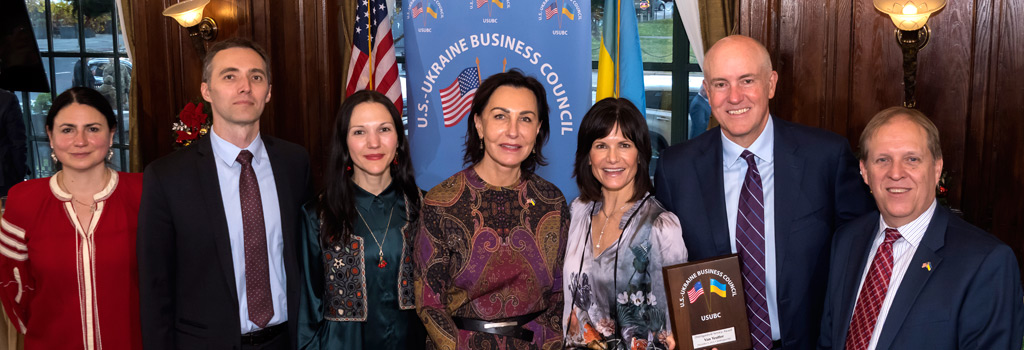Featured Galleries USUBC COLLECTION OF OVER 160 UKRAINE HISTORIC NEWS PHOTOGRAPHS 1918-1997
 Holodomor Posters
Holodomor Posters

CMS European Real Estate Deal Point Study 2018
 CMS Cameron McKenna,
CMS Cameron McKenna,
Kyiv, Ukraine, Mon, Oct 22, 2018
Property investment approaches record levels in sellers’ market
- Excess demand continues to ensure strong negotiating position of sellers
- Investors look to specialist properties for higher yields
- Strong economic environment fuels positive outlook for real estate investment
Stuttgart – Good economic factors are helping to drive continued strong growth in the European property market. Investment reached a near-record total of EUR 234bn in 2017 and was 7% above previous year's level. In particular, the positive development on the employment market and the favourable mood among consumers inspired the property investors' confidence. Incalculable factors such as the impending Brexit, trade wars and possible interest rate rises, however, hardly had any impact.
Sellers again had a strong negotiating position against a backdrop of excess demand on the property investment market and the ongoing lack of alternative investment opportunities, which they were able to use as a tool for agreeing seller-friendly provisions in the purchase agreements. The dominating asset class still was office property. Historically low yields, however, led to increased investor activity in alternative asset classes.
These findings are set out in the CMS European Real Estate Deal Point Study 2018. International law firm CMS compiled the study by analysing purchase agreements from more than 1,350 transactions on the European property investment market on which it advised in 14 countries from the start of 2010 to the end of 2017.
“In this fourth edition of our Deal Point Study we see a European real estate market that continues to attract high levels of investment activity,” said Dr Volker Zerr, a partner in the Real Estate & Public group at CMS in Germany. “High and rising prices always point to a sellers’ market, and our detailed analysis of purchase agreements demonstrates how sellers were translating their strong negotiating positions into contractual advantage.”
Rising demand for specialist properties
Office property was the strongest asset category in 2017, accounting for around 40% of transactions. But with excess demand fuelling sharp price rises and depressing yields for office property, investors looked to specialist properties – including hotels, serviced apartments, student accommodation and care homes – which offer the prospect of higher returns. At 14% of market transactions, 2017 marked another high for alternative assets, the significance of which has been continuously trending upwards in recent years.
The demand for logistics properties also rose considerably in 2017. The market share increased from 4% to 14%. The continuing e-commerce trend was a key factor that led to a rising demand for warehouse and distribution space.
"This increasing demand was of particular interest for project developers and value-add investors who were especially active on the logistics properties market in 2017", said Dr Dirk Rodewoldt, Head of the Real Estate & Construction Group at CMS.
Sellers’ market reflected in contract trends
Sellers again enjoyed strong negotiating positions in 2017. This was particularly reflected by an increase in the proportion of seller-friendly liability provisions. More than half of the reviewed purchase agreements (56%) contained de minimis clauses limiting liability. Basket clauses which also limit liability were agreed in half of all transactions in 2017 for the first time (in 2010, only 14% of the reviewed agreements included a basket clause). At 66%, caps, which specify a contractual maximum liability of the seller, also reached the highest proportion of the review period in 2017. Finally, the market mood in favour of sellers can also be deduced from the proportion of short limitation periods of not more than six to eighteen months which has further increased.
Sellers appear to be confident that buyers can pay, however. In more than half of the agreements in 2017 – as had already been the case in the two previous years - (52% and 53%, respectively), no contractual arrangements were made to ensure the buyer met its financial obligations. In the years 2013 and 2014, this percentage still was significantly lower, being 39% and 44%, respectively. One relevant factor for this development is the high proportion of financially strong institutional investors on the buyer side.
International investors to the fore
It was particularly due to the high activity of investors from the Far East that more foreign than national investors were registered as buyers in 2017. So far, this had been the case only once in the review period; in 2014, the buyers were international investors in 53% of all transactions. While national investors led the way in 2015 (53%) and 2016 (66%), international investments accounting for 51% just retained the upper hand in 2017.
- END -
For more information and/or interviews, please contact:
Contact:
Darina Gordienko
CMS Cameron McKenna Nabarro Olswang
E:darina.gordienko@cms-cmno.com/+38044 3913377
Notes to editors:
About CMS
Founded in 1999, CMS is a full-service top 10 international law firm, based on the number of lawyers (Am Law 2016 Global 100). With more than 70 offices in over 40 countries across the world and employing more than 4,500 lawyers, CMS has longstanding expertise both in advising in its local jurisdictions and across borders. From major multinationals and mid-caps to enterprising start-ups, CMS provides the technical rigour, strategic excellence and long-term partnership to keep each client ahead whatever its chosen markets. Revenues totalled EUR 1,3bn in 2017.
CMS provides a wide range of expertise across 19 expert practice and sector areas, including Corporate/M&A, Energy, Funds, Lifesciences, TMC, Tax, Banking and Finance, Commercial, Competition & EU, Dispute Resolution, Employment & Pensions, Intellectual Property and Real Estate & Construction.
For more information, please visit cms.law










